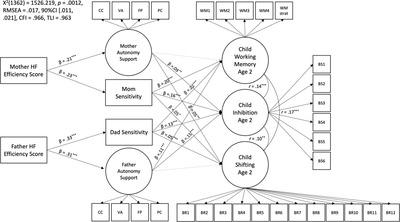Our official English website, www.x-mol.net, welcomes your
feedback! (Note: you will need to create a separate account there.)
Mothers’ and fathers’ executive function both predict emergent executive function in toddlerhood
Developmental Science ( IF 3.1 ) Pub Date : 2022-03-31 , DOI: 10.1111/desc.13263 Andrew Ribner 1 , Rory T Devine 2 , Clancy Blair 3, 4 , Claire Hughes 5 ,
Developmental Science ( IF 3.1 ) Pub Date : 2022-03-31 , DOI: 10.1111/desc.13263 Andrew Ribner 1 , Rory T Devine 2 , Clancy Blair 3, 4 , Claire Hughes 5 ,
Affiliation

|
There are multivariate influences on the development of children's executive function throughout the lifespan and substantial individual differences can be seen as early as when children are 1 and 2 years of age. These individual differences are moderately stable throughout early childhood, but more research is needed to better understand their origins. To some degree, individual differences in executive function are correlated between mother and child, but no research to date has examined these associations prior to when children are preschool age, nor have any studies considered the role of fathers’ and mothers’ executive function in tandem. Here, we use a sample of 484 families (Mothers 89.2% white; Fathers 92.5% white) in three countries (UK, USA, Netherlands) to investigate the role of each parents’ executive function on the development of children's (49.7% female) executive function from 14 (M = 14.42, SD = 0.57) to 24 (M = 24.47, SD = 0.78) months, as well as parenting practices that underlie these associations. Results of structural equation models suggest stability in some—but not all—components of executive function and growing unity between components as children age. We replicate extant findings such that mothers’ executive function predicts children's executive function over and above stability and extend these findings to include associations between father and child skills. We find an additive role of fathers’ EF, similar in magnitude to the role of mothers’ EF. Finally, for both mothers and fathers we find that sensitivity and autonomy supportive practices mediate the relations between parents’ and children's executive function.
中文翻译:

母亲和父亲的执行功能都可以预测幼儿期出现的执行功能
在整个生命周期中,儿童执行功能的发展受到多变量影响,早在儿童 1 岁和 2 岁时就可以看到显着的个体差异。这些个体差异在整个幼儿期都比较稳定,但需要更多的研究来更好地了解它们的起源。在某种程度上,执行功能的个体差异在母亲和孩子之间是相关的,但迄今为止还没有研究在儿童学龄前检查这些关联,也没有任何研究同时考虑父亲和母亲的执行功能的作用. 在这里,我们使用了来自三个国家(英国、美国、荷兰)调查每个父母的执行功能对 14(M = 14.42,SD = 0.57)到 24(M = 24.47,SD = 0.78)个月的儿童(49.7% 女性)执行功能发展的作用,以及作为这些联系的基础的育儿实践。结构方程模型的结果表明,随着儿童年龄的增长,执行功能的某些(但不是全部)组件具有稳定性,并且组件之间的统一性不断增强。我们复制了现有的发现,即母亲的执行功能可以预测孩子的执行功能,而不是稳定性,并将这些发现扩展到包括父亲和孩子技能之间的关联。我们发现父亲的 EF 具有附加作用,其幅度与母亲的 EF 的作用相似。最后,
更新日期:2022-03-31
中文翻译:

母亲和父亲的执行功能都可以预测幼儿期出现的执行功能
在整个生命周期中,儿童执行功能的发展受到多变量影响,早在儿童 1 岁和 2 岁时就可以看到显着的个体差异。这些个体差异在整个幼儿期都比较稳定,但需要更多的研究来更好地了解它们的起源。在某种程度上,执行功能的个体差异在母亲和孩子之间是相关的,但迄今为止还没有研究在儿童学龄前检查这些关联,也没有任何研究同时考虑父亲和母亲的执行功能的作用. 在这里,我们使用了来自三个国家(英国、美国、荷兰)调查每个父母的执行功能对 14(M = 14.42,SD = 0.57)到 24(M = 24.47,SD = 0.78)个月的儿童(49.7% 女性)执行功能发展的作用,以及作为这些联系的基础的育儿实践。结构方程模型的结果表明,随着儿童年龄的增长,执行功能的某些(但不是全部)组件具有稳定性,并且组件之间的统一性不断增强。我们复制了现有的发现,即母亲的执行功能可以预测孩子的执行功能,而不是稳定性,并将这些发现扩展到包括父亲和孩子技能之间的关联。我们发现父亲的 EF 具有附加作用,其幅度与母亲的 EF 的作用相似。最后,











































 京公网安备 11010802027423号
京公网安备 11010802027423号